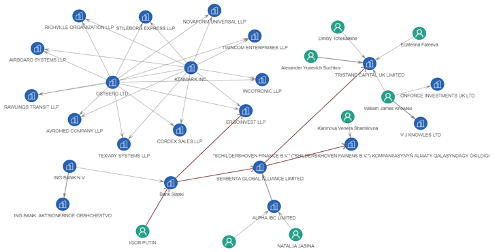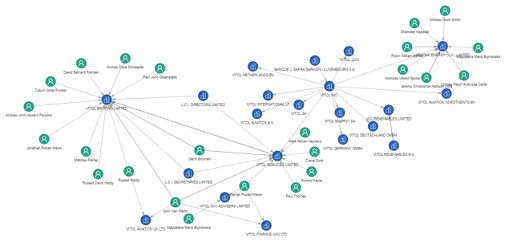
Cambridge Analytica’s alleged role in engineering Trump’s victory changed the way we understand personal data protection. The US Congress auditioned the Californian tycoons of social media and as a result, initiated a new set of laws concerning consumers' data privacy. The EU started to implement since 2018 the General Data Protection Regulation, hindering the processing of personal data across all industries, including the banking sector. Does GDPR curtail the compliance process? If, the answer is yes, what is the impact on the client discovery process?
Pursuant of the California Consumer Privacy Act (the US equivalent of GDPR), personal information represents non-public data that identifies, relates to, describes, is reasonably capable of being associated with, or could reasonably be linked (directly or indirectly) with an induvial.
Needless to say, that within a financial institution, the KYC process deals with non-public data about an individual. Moreover, a fully-fledged client discovery process allows inferring information about a client based on the available data. For instance, the address history could be a good indicator of an individual's revenue evolution over time.
Furthermore, non-public information can be inferred from public data. For example, data about companies' ownerships in various jurisdictions can help to determine the estimated wealth of an individual. The inference is necessary for an efficient KYC process, as an institution should collect only 20% of data about of individual to get 80% of the total information.
If banks implement GDPR to the letter, then they should do only high-level checks and avoid most data processing and storing. A comprehensive KYC requires more than box-ticking and implies processing all available data that can be used directly or indirectly to paint the client's full picture. At this point, most European financial intuitions face a double-edged dilemma. On the one hand, being GDPR compliant could leave big holes in their systems aimed to combat economic crime. On the other hand, implementing a thorough KYC process, aligned with the 5th AML Directive would leave them vulnerable to breaches of data privacy rules.
“Corporations like Google, Facebook, Amazon, all of these large companies, are making tens or hundreds of billions of dollars off of monetising people's data.”
Brittany Kaiser, former business development director for Cambridge Analytica.
FinCEN Leaks: ING
FinCEN leaks do not spare anyone. Major financial institutions appear one after the other, in media portraited in all types of horrendous scandals. It was ING's turn to saw its name pounced on in relation with allegations of helping Russian oligarchs to move monies. ING's subsidiary in Poland, Bank Slaski transacted substantial amounts with Serbenta Global Alliance, a Cyprus based company and with a British counterparty called Ergoinvest. Ergoinvest has a rather complex profile, being exposed to jurisdictions like Dominica and Lithuania. Serbenta's ultimate owners are Lithuanian citizens. Moreover, Serbenta did transactions with two brokers: Schilderhover based initially in the Netherlands and Tristane Capital. Interestingly, Schilderhover has an office in Kazakhstan, and Tristane Capital includes several persons with significant control holding Russian and Moldavian citizenships. Amongst, the clients of ING's Polish branch, that used the above scheme, the name Igor Putin rings a bell as Russian president's cousin. And yet, despite the unusual geometry of the scheme, the allegations of money laundering require more substantial evidence.

Commodity traders: Vitol
Vitol, together with Trafigura and Glencore is the world's leading commodity trading houses. Trading commodities and especially physical commodities is a rough business, and those involved need thick skin and a lot of creativity. Physical resources are harboured in countries with dodgy politicians and opaque legislation but are traded in financial centres with stricter laws. It is the role of commodity traders to close this gap and to take care of business. The commodity traders' milieu is closed, many legends and myths emerging from their endeavours.
Recent allegations of corruption surged when a former Vitol executive in Brazil, Marcio Dutra Goncalves decided to cooperate with the Brazilian justice. He unveiled a scheme of bribery involving Petrobras, Brazil's leading oil producer. Goncalves said that he paid on behalf of its former employer bribes to Petrobras personnel to extract essential intelligence than would have given the Dutch company a strategic advantage over the competition. More than 2 million USD was paid to grease the flow of non-public information.
The fact that commodity traders use unorthodox methods is new only to dreaming souls. The critical question is how a company incorporated in a Western country can pay significant amounts of monies supposedly in cash to recipients based in emerging countries. What is the flow of the paper?
The answer sits in the complex structure of such companies. For instance, Vitol is originally from the Netherlands, has its main operating base in Switzerland, and the holding company is based in Luxembourg and Panama. Based on this architecture, Vitol establishes in different target countries partnerships with a local player. For instance, in Kazakhstan, Vitol had a collaboration with an Azeri firm, Arawak Energy, which had until last year a presence in the UK.
When a commodity trading firm needs to address a burning matter in an emerging country, it is the local partner that takes care of business.

Brussels tackling ¨golden visas¨
The European Commission started to take a closer look at the member countries that offer "residence for investment" programs. After the Cyprus Papers unfolded a new scandal involving, criminals, dictators and oligarchs, Brussels decided to take the bull by the horns. Bulgaria, Greece, Malta and Portugal are a few of the countries offering European residence for a fee. If Brussels suspends the programs in the concerned jurisdictions, the European bureaucrats should also find new sources of funding for the dwindling budgets of those countries.
Word on the street: Matteo Messina Denaro
After almost thirty years, an Italian court ruled that Matteo Messina Denaro is responsible for planning the assassination in 1992 of the legendary anti-mafia prosecutors Giovanni Falcone and Paolo Borsellino.
The Sicilian mafia lost the supremacy amongst the Italian syndicates being surpassed by the Calabrian neighbours. Nevertheless, Denaro remains a living legend in Italy's intricate underworld. For every respectable mafioso, being fugitive (la latitanza) is almost an initiation passage towards a higher level. In this matter, Denaro exceeded all expectations being on Interpol's most-wanted list for over three decades. Most experts believe he hides in his native Sicily or that he resides in Spain or even in the South of France. South America or the Balkans would be a more plausible hypothesis.